Canon Press Theology Collection (9 vols.)
Digital Logos Edition
Overview
The Canon Press Theology Collection addresses the issues that are fundamental to developing and maintaining a Biblical theology and worldview. Each title is designed to address difficult theological subject matter in such a way that even a young student will benefit. The issues discussed include the Nicene Creed, the Trinity, the doctrine of Scripture, themes of Christian unity and biblical concepts of corporate worship. Many of the titles include chapter summary questions to allow for further study in personal, group, or classroom settings.
The three titles by Ralph Smith discuss and explain the doctrine of the Trinity from an informed and approachable Reformed position. The Lord’s Service by Jeffrey Meyers attempts to outline a worship service that is both relevant and biblically sensitive to the Triune God. Keith A. Mathison traces the Reformer’s concept of sola Scriptura throughout the centuries to uncover the erroneous ways in which it is lived out in today’s Evangelical churches. L. Charles Jackson handles the Nicene Creed and defends the necessity of maintaining a creedal faith in modern times. Other titles address key issues such as Christian hospitality and overcoming the pitfalls of bitterness.
What is more, with the Logos edition of these titles you can easily participate in each author’s discussion of key Scripture passages simply by hovering the mouse cursor over each Scripture reference. Quickly reference and research key themes and theological concepts in your entire digital library. These titles will be a welcomed addition to the library of any home school family, lay theologian, pastor, or theology student.

Key Features
- Sound theology from a Biblical Worldview
- Study questions for further reflection and research.
- Theologies on: the Trinity, Scripture, Christian community, and Christian witness
Product Details
- Title: Canon Press Theology Collection
- Publisher: Canon Press
- Volumes: 9
- Pages: 1,838
Individual Titles
- Eternal Covenant: How the Trinity Reshapes Covenant Theology
- Face to Face: Meditations on Friendship and Hospitality
- Faith of our Fathers: A Study of the Nicene Creed
- How to Be Free From Bitterness: And Other Essays on Christian Relationships
- The Lord’s Service: The Grace of Covenant Renewal Worship
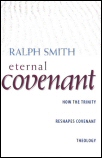
In this book Smith delves deeper into the discussion at the intersection of covenant and trinitarian theology that he began with Paradox and Truth. Though many Reformed theologians have recognized an agreement between the Father and the Son for the salvation of the human race, few have explored the vast theological possibilities of an eternal covenant that involves all three persons of the Trinity. Instead, covenantal soteriology has focused on the so-called covenant of works between God and Adam, which turns out to be problematic both biblically and theologically. Smith places the eternal covenant in the position it deserves—the keystone of biblical and systematic theology—with profound consequences for the Reformed worldview.
Smith's research is valuable for a concise statement of the variety of opinions expressed over the past 500 years of Reformed scholarship on the topics addressed.
—Online Reviewer
Ralph Smith (M.Div. Grace Theological Seminary) is pastor of Mitaka Evangelical Church in Tokyo, Japan and serves as director of the Covenant Worldview Institute. He and his wife, Sylvia, have three children.

The heart of Christian reality is a society—a Trinity—of persons living with and for one another. God created us to live in bonds of society and friendship, not as lone rangers. The Christian faith presents friendship and hospitality not as luxuries but necessities. God does not save us in isolation but in community with other people. There is no possibility of living to the glory of God apart from godly companions. In this book, Steve Wilkins seeks to call us back to the joyous obligations of friendship and hospitality.
Wilkins calls us to examine the nature of biblical friendship and hospitality, both of which are sadly lacking in 21st century America.
—Online Reviwer
Steve Wilkins (M.Div., Reformed Theological Seminary) is an ordained minister in the Presbyterian Church in America and serves as pastor of Auburn Avenue Presbyterian Church, Monroe, Louisiana. He and his wife, Wendy, have six children.
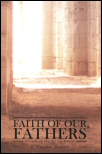
It's not whether you have a creed or not, just which.
"No creed but Christ." This claim tries to remove the mess of doctrinal controversy. After all, doesn’t everyone know that “doctrine divides?” But would avoiding creeds and confessions really clear away confusion?
As the church’s first “official” ecumenical creed, the Nicene Creed has protected and shaped the life of God’s people for centuries. L. Charles Jackson’s popular study walks readers through every line of the Nicene creed, highlighting its history and contemporary application, and revealing its grounding in Scripture. It shows us a Nicene Creed that is pastoral, practical, and personal. Questions for further reflection accompany each chapter.
L. Charles Jackson (M.A., University of Leicester, England; M.A., Reformed Theological Seminary) is pastor of Covenant Presbyterian Church in Dayton, Ohio and a Ph.D student at the University of Leicester, England. He and his wife, Connie, have six children.
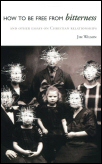
Bitterness often grows out of a small offense—perhaps a passing word, an accidental shove, or a pair of dirty socks left in the middle of the living room floor. Yet when bitterness takes root in our hearts, its effects are anything but small.
In this collection of short articles, Jim Wilson and others discuss what it means to live as "imitators of God." As the Apostle Paul says in Ephesians, we have been called to leave the bitterness and anger of the world and instead embrace the love and compassion of our God. The authors remind us that we are to forgive others just as we have been forgiven, pointing to Scriptural admonitions and examples as they offer sound teaching on the trials and temptations of everyday life. Questions for further reflection accompany each article.
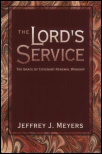
Begun as a practical pastoral guide to worship, this book balances theory and praxis to create a compelling case for a biblical, aesthetic, and covenantal worship service as the place where the Triune God and His people renew the bonds of love and loyalty. Jeffrey Meyers begins laying out a case for a covenant renewal service by means of Old Testament sacrificial liturgics, biblical typology, and covenant theology. He then guides us through the stages of a covenant renewal liturgy, explaining from Scripture the meanings of each step of the service. The final section addresses miscellaneous issues in worship, such as the use of creeds, the “regulative principle,” and ministerial clothing. Jeffrey Meyers provides not only a compelling biblical, theological, and historical case for covenant renewal worship, but also shows that it is beautiful, profound, edifying and liberating.
Jeffrey Meyers is a graduate of Concordia Theological Seminary and pastor of Providence Reformed Presbyterian Church (PCA), St. Louis, Missouri.
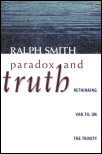
More than 1,500 years after the foundational church councils, the doctrine of the Trinity is still as central and as puzzling to theologians as ever.
Reformed theology has seen increasing calls for the Trinity to live at the center of Christian confession, prompting the need for a fuller biblical and practical understanding of the subject.
In recent Reformed thought, Cornelius Van Til and Cornelius Plantinga, Jr. have proposed important Trinitarian theologies. Ralph Smith assesses these views and, filling out a Van Tilian perspective with Kuyper’s lesser-known covenantal view, he provides a refreshing biblical, historical, and applicable perspective on this key Christian reality.
Ralph Smith (M.Div. Grace Theological Seminary) is pastor of Mitaka Evangelical Church in Tokyo, Japan and serves as director of the Covenant Worldview Institute. He and his wife, Sylvia, have three children.
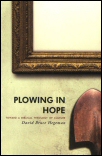
Culture is a continuing, forward process—the gradual unveiling of truth as life. But often we get ensnarled. We can only imagine culture as a war, a gritty ideological and religious struggle where every arena is bloody with strife: art, philosophy, cuisine, music, literature, science. But at its foundation, culture is about building, not conflict. The time has come for us to beat our swords into plowshares.
By realizing the Bible’s vision for a cultivated earth, we can build a more comprehensive, radical, holistic culture, resistant to compromise and dedicated to a Trinitarian aesthetic. What does this culture look like? It is the development of the earth into a global fabric of gardens and cities in harmony with nature—a glorious garden-city. Plowing in Hope provides a positive, clear, and colorful introduction to this transformational topic.
Many Christians are beginning to recognize that in the absence of a godly culture our civilization will continue its free fall, no matter how political they get. But when modern believers address culture, it appears they do little more than criticize Hollywood while doing “Christian” MTV. David Hegeman’s approach is refreshingly different. He maps out a positive theology of culture building rooted in Creation and extending into the New Jerusalem. His wonderful little book, based on sound Biblical exegesis, presents a compelling case for why and how we should build a culture that magnifies God and ennobles men.
—David Ayers, Grove City College, Pennsylvania
Romantic naturalists and pragmatic city dwellers alike must grapple with God’s call to create culture. Plowing in Hope provides biblical purpose as many of us grapple with out paradoxical desires to be both farmer and technologist. Hegeman’s artistic language, engaging examples, and thoughtful reasoning make for fruitful reading; he offers joyful expectancy to all faithful and hard-working servants of the Lord.
—Brian Ray, Ph.D., President, National Home Educational Institute, Salem, Oregon
David Hegeman resides in Newburg, Oregon, with his wife and four children. He studied art history at the University of Pittsburgh and Oberlin College. He works as a librarian and enjoys watercolor painting. He is a member of the OPC.
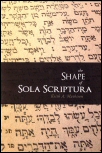
In what shape do we find the doctrine of sola Scriptura today? Many modern Evangelicals see it as a license to ignore history and the creeds in favor of a more splintered approach to the Christian living. In the past two decades, Roman Catholic and Eastern Orthodox apologists have strongly tried to undermine sola Scriptura as unbiblical, unhistorical, and impractical. But these groups rest their cases on a recent, false take on sola Scriptura.
The ancient, medieval, and classical Protestant view of sola Scriptura actually has a quite different shape than most opponents and defenders maintain. Therein lies the goal of this book—an intriguing defense of the ancient (and classical Protestant) doctrine of sola Scriptura against the claims of Rome, the East, and modern Evangelicalism.
The issue of sola Scriptura is not an abstract problem relevant only to the sixteenth-century Reformation, but one that poses increasingly more serious consequences for contemporary Christianity. This work by Keith Mathison is the finest and most comprehensive treatment of the matter I've seen. I highly recommend it to all who embrace the authority of sacred Scripture
—R. C. Sproul, Ligonier Ministries
Too often Evangelicals have allowed a Scripture Alone principle to become a Scripture Only principle that disparages the church’s creeds and confessions. Therein lies the invaluable contribution of The Shape of Sola Scriptura. It marks a critical step forward in the renewal of a confessional consciousness among Evangelicals.
—Charles P. Arand, Concordia Seminary, St. Louis
Keith A. Mathison (M.A. in Theological Studies, Reformed Theological Seminary) is author of Dispensationalism: Rightly Dividing the People of God? and Postmillennialism: An Eschatology of Hope.
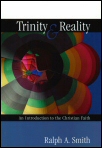
The Trinity is the heart of the Christian gospel, but Father, Son, and Holy Spirit seldom occupy that position in contemporary discussions of the Christian worldview. This book helps fill the need by unveiling the Trinity at the center of reality.
Ralph Smith shows how Trinitarian life shapes covenants, creation, revelation, miracle, kingdom, self, church, and eternity. He compares the Trinity to opposing viewpoints, including secularism and other religions, highlighting the practical implications of Trinitarian and non-Trinitarian views for the individual and society.
This book provides basic training for all Christians, especially students, high school and up, who desire to transform the foundations of culture. Questions for further study accompany each chapter.
Without a doubt this book is foundational to a completely and distinctively biblical worldview.
—Online Reveiwer
Ralph Smith (M.Div. Grace Theological Seminary) is pastor of Mitaka Evangelical Church in Tokyo, Japan and serves as director of the Covenant Worldview Institute. He and his wife, Sylvia, have three children.